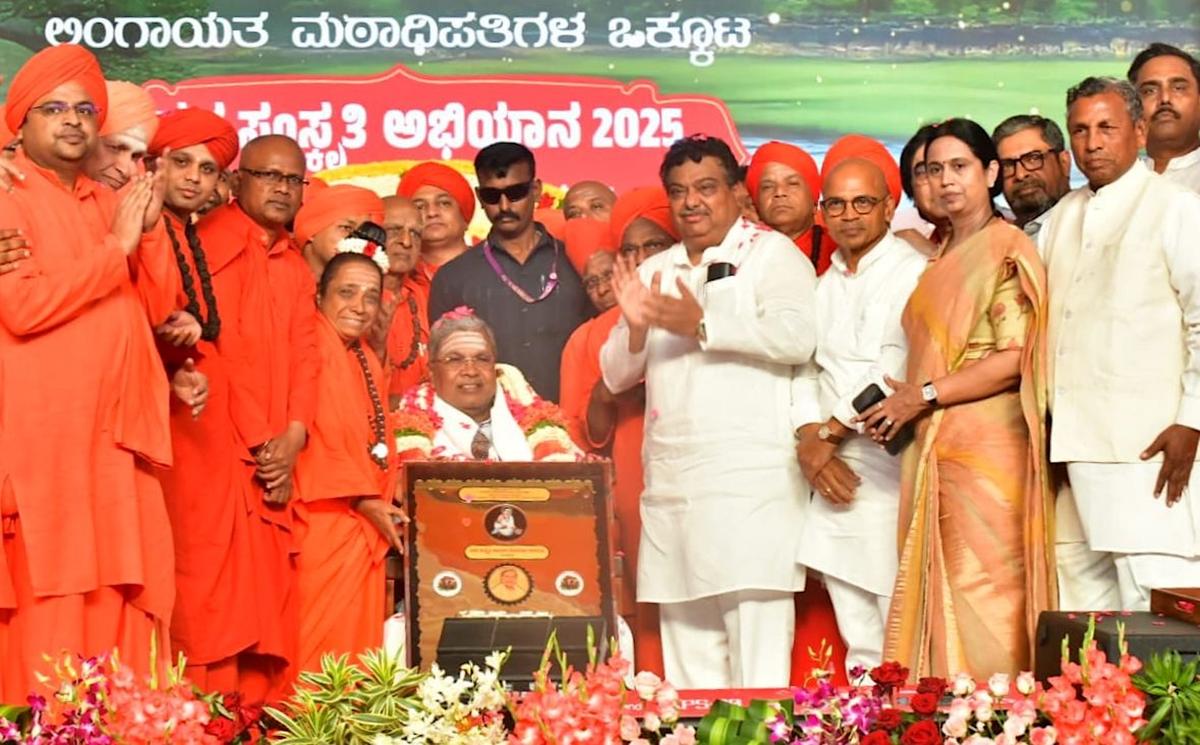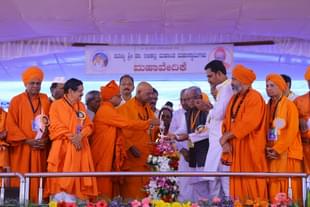The long-standing debate over granting Lingayats a separate religion status has resurfaced in Karnataka, reigniting social and political tensions within the state. The demand was voiced once again during a public event attended by Chief Minister Siddaramaiah, where several Lingayat leaders urged the government to recognize their faith as distinct from mainstream Hinduism. They argued that the teachings of 12th-century reformer Basavanna were rooted in a philosophy separate from Brahminical traditions, emphasizing equality, rationalism, and social reform.
During the gathering, leaders highlighted that the Lingayat community had long felt misrepresented within existing religious classifications. They claimed that recognizing Lingayatism as an independent religion would restore historical accuracy and honor the principles of Basavanna’s Anubhava Mantapa. The Chief Minister, while refraining from making any commitment, stated that his government respected all faiths and would review the concerns raised. His presence at the event, however, has given the movement fresh visibility, prompting renewed debate across Karnataka’s political landscape.
The issue, dormant for several years, has now returned to the forefront as community organizations mobilize support. Political observers note that the timing is significant, with local elections approaching. The Lingayat community—one of Karnataka’s most influential social groups—holds substantial electoral power. Reviving the demand for separate recognition has once again placed pressure on the ruling government to balance political pragmatism with religious sensitivities, making it a matter of both identity and governance.


Historical and Political Roots of the Demand
The movement for separate religion status first gained traction in the late 20th century, peaking during the 2017–18 political cycle. It stems from interpretations of Basavanna’s Vachanas, which advocate personal devotion over rituals and reject caste hierarchy.
Historians note that while Lingayatism shares cultural links with Hinduism, its reformist and egalitarian philosophies distinguish it ideologically. Political divisions have, however, often overshadowed theological nuances.
Chief Minister Siddaramaiah, a veteran of Karnataka’s caste and community politics, responded with measured diplomacy. He acknowledged the community’s contributions to Karnataka’s social and spiritual development while avoiding a direct stance on the question of separate status. His government, he said, would approach the matter in consultation with all stakeholders. Political observers noted that Siddaramaiah’s tone reflected an attempt to avoid alienating either side—those demanding recognition and those opposing fragmentation within the Hindu fold.
Several Lingayat mutts, especially in northern Karnataka, have now renewed their efforts to build consensus among their followers. Religious heads are organizing discussions, symposiums, and spiritual congregations to reexamine the philosophical foundations of Basavanna’s teachings. Their argument remains consistent: Lingayatism, with its rejection of idol worship and emphasis on personal devotion, cannot be confined within the traditional Hindu framework. This theological distinction forms the cornerstone of their demand for separate recognition.
However, within the community itself, there is no complete unanimity. A section of Veerashaiva-Lingayat leaders oppose the separation, insisting that the two identities are intertwined and inseparable. They argue that creating a separate religion would dilute their shared heritage and weaken collective influence. This internal divide has historically complicated political responses, forcing parties to tread carefully around the sensitive subject.
Legal experts remind that religion recognition is a complex constitutional matter. The 2017 state cabinet’s recommendation for separate religion status remains pending with the Union government, which had sought further clarification. For any such recognition to materialize, a central notification under the Census Act and relevant constitutional provisions would be required. This process involves both theological and administrative scrutiny, often extending over years.
Meanwhile, community youth organizations have begun using social media to mobilize support for the cause. Campaigns under hashtags advocating Lingayat identity have gained traction, with younger generations expressing pride in their distinct philosophical heritage. These online movements, though peaceful, have also attracted criticism from those who see them as divisive or politically motivated. The digital mobilization reflects the growing generational shift in how religious identity is asserted in modern Karnataka.
Political parties have reacted cautiously to the renewed demand. The Congress has maintained that the issue will be addressed based on constitutional processes, while the BJP has accused the ruling party of playing identity politics ahead of upcoming elections. The Janata Dal (Secular), too, has urged restraint, suggesting that social harmony should not be disturbed by reopening sensitive religious debates. Despite these political statements, each party remains acutely aware of the electoral implications the issue carries.
Cultural scholars argue that beyond politics, the debate highlights the need for broader introspection about Karnataka’s religious diversity. They note that Basavanna’s reformist ideals were inherently inclusive, transcending caste and creed. The true tribute to his vision, they say, would be to practice equality and compassion rather than to engage in sectarian disputes. Yet, they acknowledge that the demand for recognition also arises from a long history of cultural marginalization, making it both a spiritual and socio-political struggle.
In districts like Bagalkot, Dharwad, and Vijayapura—traditional strongholds of Lingayat culture—the renewed movement has revived memories of earlier agitations. Local processions, public debates, and religious gatherings have taken place, where speakers invoked Basavanna’s message of social justice. Many participants view the current push not merely as a religious claim but as a statement of cultural pride and resistance to centralization of faith narratives.
The Chief Minister’s office has since clarified that no formal proposal is currently under consideration. However, it also stated that the government remains open to discussion with community representatives if a fresh memorandum is submitted. This carefully worded statement reflects the administration’s attempt to strike a balance between respect for the community’s aspirations and the broader goal of maintaining religious harmony.
Several historians have noted that the Lingayat movement has always been deeply intertwined with Karnataka’s regional identity. From literature to philosophy, the faith’s influence is visible across the state’s cultural fabric. Basavanna’s teachings have shaped the Kannada language’s moral tone and literary consciousness. Therefore, the renewed demand, they argue, is not just about religion—it’s about reclaiming a narrative that is uniquely rooted in Kannada ethos and intellectual history.
In contrast, critics of the movement warn that carving out separate religious identities could open the door for further fragmentation within society. They argue that Basavanna’s principles of unity, moral integrity, and humanism transcend formal labels. Some religious leaders from other communities have appealed for moderation, reminding that the spirit of Basavanna’s philosophy was inclusive, not separatist.
As Karnataka’s political climate heats up, the renewed Lingayat demand has once again underscored the intricate relationship between faith and governance. The coming months are likely to witness continued discussions, negotiations, and perhaps even mobilizations. Whether the government moves toward official recognition or maintains the status quo, the issue has already reignited a deep philosophical and political conversation—one that cuts across centuries, from the era of Basavanna’s Anubhava Mantapa to the complex realities of contemporary Karnataka.


Government’s Balancing Act
Chief Minister Siddaramaiah assured that the issue would be handled with sensitivity, avoiding polarization. Officials hinted that any decision would require extensive consultations with religious heads, scholars, and legal experts.
Meanwhile, the government has urged restraint, appealing to community leaders to prioritize unity over conflict as discussions on religious recognition continue across multiple platforms.

The fresh resurgence of the Lingayat separate religion demand has sent ripples through Karnataka’s political and religious circles. What began as an appeal by a few community leaders at a public event attended by Chief Minister Siddaramaiah has quickly evolved into a wider conversation about faith, identity, and the state’s political future. The presence of the Chief Minister lent the issue renewed legitimacy, with many interpreting his silence on the matter as a cautious acknowledgment of the community’s influence. His remarks, urging dialogue rather than confrontation, have not stopped leaders from reigniting the long-debated demand that has historically shaped the dynamics of Karnataka politics.
The Lingayat community, one of the largest and most politically significant in the state, has long held sway in both spiritual and social spheres. With roots tracing back to the 12th century reformer Basavanna, the Lingayat faith emerged as a movement against caste-based discrimination and ritualistic orthodoxy. Basavanna’s teachings promoted equality, rationalism, and devotion through direct experience rather than priestly mediation. Over time, however, internal divisions and political interpretations have blurred the distinction between Lingayatism and mainstream Hinduism, fueling debates over identity that persist to this day.
At the recent gathering, several prominent seers and community leaders argued passionately that Lingayatism deserved recognition as an independent religion. They cited past recommendations and previous efforts made during the Siddaramaiah government’s earlier tenure, when a proposal had been forwarded to the Union government seeking such status. Though the proposal was never acted upon, it continues to serve as a rallying point for Lingayat organizations, who see it as unfinished business in their quest for religious autonomy and historical justice.
Political analysts point out that the revival of the issue could have far-reaching electoral consequences. The Lingayat community, estimated to constitute around 17 percent of Karnataka’s population, has traditionally played a decisive role in determining electoral outcomes. Any renewed mobilization around the idea of separate religious identity could alter the balance of power among political parties, particularly the Congress and the BJP, both of which have relied heavily on Lingayat support in the past. The community’s sentiments, therefore, carry significant political weight.
Follow: Karnataka Government
Also read: Home | Channel 6 Network – Latest News, Breaking Updates: Politics, Business, Tech & More

